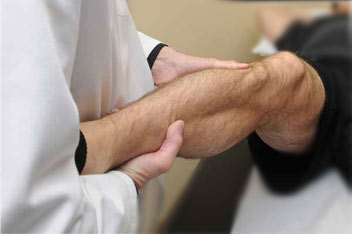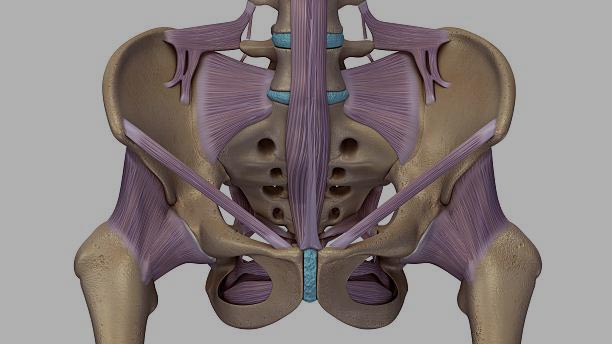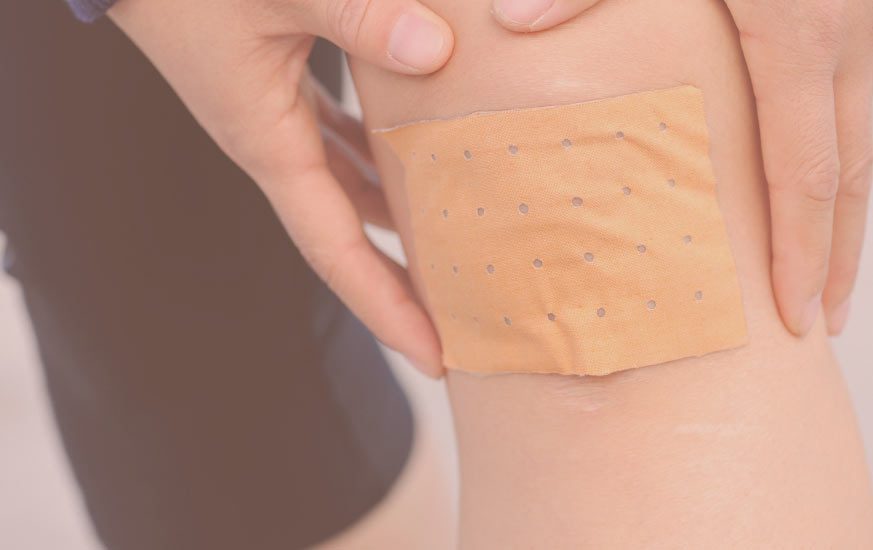Replacement Parts for Your Knees
Although it’s commonly referred to as such, it may be misleading to call this type of surgery knee replacement; a more accurate term might be knee rebuilding.
 Our medical team can evaluate your knee, using x-rays and other imaging technology, so we can assess the damage. Sometimes the surgeon needs only to remove damaged tissue from the knee, a procedure called debridement. In other cases, a total knee replacement is recommended.
Our medical team can evaluate your knee, using x-rays and other imaging technology, so we can assess the damage. Sometimes the surgeon needs only to remove damaged tissue from the knee, a procedure called debridement. In other cases, a total knee replacement is recommended.
Knee replacement surgery is recommended when pain gets to the point where it limits your daily activities; when it interferes with your ability to sleep; when other treatments have failed; or in the case of a deformity.
The most common reason for chronic knee pain is osteoarthritis. In patients with this condition, the cartilage and fibrous tissue (called meniscus) are gradually worn away. Since these tissues prevent bone-on-bone contact, the lack of cushioning results in pain.
There is no known cure for osteoarthritis, and it tends to become progressively worse as the patient gets older.
Knee Replacement Process
The first step towards relieving the pain is to meet with Dr. Jesse Shaw and discuss your condition. He will ask for some information: When did the pain start? Do you constantly feel pain, or does it come and go? Have you injured the knee at some point in the past?
Dr. Shaw will also need your medical history. He will conduct a physical exam, and order imaging tests that reveal the type and extent of damage to bone, cartilage and ligaments. These tests may illustrate what is causing the pain. Together, you and your doctor can decide on a treatment plan.
Total knee replacement surgery does not come with a lifetime guaranty. Your knee will not enable you to run a marathon or indulge in mogul-jumping on the ski hill. But you will probably be able to swim, play golf or tennis, drive a car, ride a bicycle, or dance without pain.
While osteoarthritis tends to worsen with age, it’s interesting to note that half of patients undergoing knee surgery are under 65; most of them are still working. Knee injury is an equal-opportunity condition.
For more information, see the web site of the American Association of Orthopedic Surgeons (AAOS):
To watch a video describing one patient’s experience with knee replacement, see: Beyond Surgery Day: The Full Impact of Knee Replacement
Common Questions about Knee Replacement
How long does it take to recover from a knee replacement?
Full recovery from knee replacement surgery depends on how invasive the procedure is, but generally the process takes around 3-6 months.
Within 12 to 24 hours after the procedure, most patients are able to stand and walk again, with the help of crutches. You’ll also be given some exercises to aid in strengthening your knee.
It’s common for patients to be able to return to their normal routine by the 6th week, though there will still be some pain and swelling for a few months. It may take up to a year to participate in more intensive activities. Sticking to your doctor’s instructions during your recovery period is a must to ensure faster healing.
How painful is having a knee replacement?
Some pain and swelling is normal and expected after surgery, whether it is partial or total knee replacement. Pain is highest during the first week but you should not worry as your specialist will prescribe pain medication to alleviate this.
While you are recovering, the pain diminishes over time until you are fully healed. For instance, most knee replacement patients experience very little pain after 3 months.
As the level of pain and recovery time can vary for each individual, our specialists here at All-Pro will discuss pain management and rehabilitation thoroughly with you, before and after your surgery. You should not be have severe pain at any point during recovery, so it’s best to contact your doctor in case this happens.
Can you walk immediately after knee replacement?
Provided that there are no complications, yes, you should be able to walk within the same day of your knee replacement surgery. In fact, your doctors will likely advise you to do so, as this will encourage healing.
You will need crutches or a walker for the first few days or weeks, and will be given instructions on when to increase your walking distance.
These will all be part of the post-operative instructions provided to you. You’ll need to strictly adhere to the recommendations of specialists including your physical therapist, and continue with your follow-up visits with your orthopedic surgeon.
What is the best age to have a knee replacement?
There is no specific age bracket for getting knee replacement surgery. There are a variety of factors that may make you a viable candidate for the procedure, and age is just one of them.
In the past, patients over the age of 50 have been found to be typical knee replacement candidates. However, over time, cases of early osteoarthritis and other knee problems have been rising, hence it is becoming more common for younger patients to undergo the procedure, too.
The best time for you to consider knee replacement depends on your pain level, how much it is affecting your quality of life, and your overall health, among others. Have a consultation with our orthopedic specialists regarding the possible risks and benefits of the procedure for your specific age and condition.
Are there permanent restrictions after knee replacement?
There aren’t a lot of long-term restrictions following a successful knee replacement surgery. However, most orthopedic specialists would warn against participating in high impact and repetitive activities that may put too much pressure on your knee.
Generally, you should still be able to engage in physical activities and sports once you are fully recovered. Kneeling is also fine, as long as it does not cause you discomfort.
The main goal for limiting some activities, such as long distance running, is to ensure that your implant would last longer. The younger you are, the more important it is to consider, as implants usually last around 20 to 30 years. It’s also best to speak to your doctor if you are unsure of whether you can perform a specific activity.














